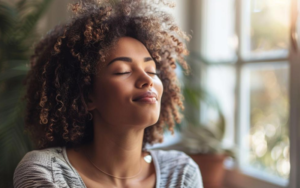Playing Spaceman Slot is a mainstay for players to earn money
Playing Spaceman Slot is a mainstay for players to earn money With interesting features and stunning graphics, the situs slot spaceman from Pragmatic Play will

Anxiety disorders affect millions worldwide, leading many to seek natural remedies. Among these, THCa (tetrahydrocannabinolic acid) flower has gained attention for its potential benefits. Unlike THC (tetrahydrocannabinol), THCa is a non-psychoactive cannabinoid found in raw cannabis. This means it doesn’t produce the “high” typically associated with cannabis use, making it an appealing option for those seeking relief from anxiety without altering their mental state.
THCa, or tetrahydrocannabinolic acid, is a cannabinoid found in the raw cannabis plant. Unlike THC, which is psychoactive and responsible for the “high” associated with cannabis, THCa is non-psychoactive. This distinction is crucial for individuals seeking the medicinal benefits of cannabis without the mind-altering effects. THCa is abundant in fresh cannabis and begins to convert to THC when exposed to heat through a process called decarboxylation.
The primary difference between THCa and THC lies in their chemical structure and effects on the body. THCa has an extra carboxyl group, which prevents it from binding effectively to the CB1 receptors in the brain, thus not producing a high. When heated, this extra group is removed, converting THCa into THC. While THC is known for its psychoactive effects, THCa is gaining recognition for its potential therapeutic benefits without the associated high, making it particularly interesting for anxiety management.

THCa is a cannabinoid found in raw cannabis plants and is known as the precursor to THC. Research suggests that THCa may offer potential health benefits, including potential relief for anxiety. When THCa is converted into delta-9 THC, it may have potential effects on the stress response, which could help with anxiety. Some studies have shown that THCa may possess benefits for anxiety relief, making it a promising option for those looking for natural remedies. The potential benefits of THCa for anxiety have sparked interest in using THCa products to help manage anxiety symptoms. While more research on THCa is needed, the current evidence suggests that THCa products may have potential health benefits for anxiety relief.
The endocannabinoid system (ECS) plays a pivotal role in regulating mood, stress, and anxiety. THCa interacts with the ECS differently than THC. It doesn’t bind directly to the cannabinoid receptors but may influence them indirectly, modulating the body’s response to stress and anxiety. This indirect interaction can help maintain balance within the ECS, potentially reducing anxiety symptoms.
THCa’s interaction with the ECS also affects neurotransmitter activity. It is believed to influence the levels of serotonin and dopamine, which are crucial in regulating mood and anxiety. By promoting a healthy balance of these neurotransmitters, THCa may help alleviate anxiety symptoms, offering a natural alternative to traditional medications that often come with significant side effects.
One of the key mechanisms through which THCa may reduce anxiety is its anti-inflammatory properties. Inflammation is often linked to anxiety and mood disorders. THCa’s ability to reduce inflammation in the brain and body can help lower anxiety levels. This anti-inflammatory effect is crucial for individuals dealing with chronic stress and anxiety, as it can provide a calming effect on the nervous system.
THCa also exhibits neuroprotective properties, which means it can help protect brain cells from damage. This is particularly important for anxiety, as chronic stress can lead to neurodegeneration. By protecting brain cells and supporting overall brain health, THCa can contribute to a reduction in anxiety symptoms. This neuroprotective quality adds another layer to its potential as a natural anxiety remedy.
Traditional anxiety medications, such as benzodiazepines and SSRIs, often come with a host of side effects, including dependency and withdrawal symptoms. THCa offers a natural alternative without these adverse effects. Unlike pharmaceuticals that may cause drowsiness, cognitive impairment, or other side effects, THCa provides a gentler approach to managing anxiety. This makes it an appealing option for those looking to avoid the complications of traditional medications.
While CBD (cannabidiol) is widely known for its anxiety-relieving properties, THCa offers some unique advantages. For one, THCa’s non-psychoactive nature means users can benefit from its effects without any risk of feeling “high.” Additionally, THCa may provide more targeted anti-inflammatory and neuroprotective benefits, which can be particularly beneficial for anxiety. Understanding these differences helps consumers make informed decisions about which cannabinoid may best suit their needs.
Consuming THCa in its raw form, such as through juicing or adding it to smoothies, allows individuals to benefit from its properties without decarboxylation. This method preserves the THCa and its non-psychoactive benefits. However, the taste and texture of raw cannabis might not be appealing to everyone, and it requires access to fresh cannabis plants, which can be a limitation for some users.
Smoking THCa flower is an effective method for those seeking quick relief from anxiety. This method involves heating the flower at a low temperature to release THCa without converting it to THC. Vaporizing allows for rapid absorption into the bloodstream, providing fast-acting relief. It also preserves the terpenes and other beneficial compounds, enhancing the overall therapeutic effect.
For long-lasting anxiety relief, edibles and tinctures are excellent options. These methods involve consuming THCa-infused products that provide sustained effects over several hours. Edibles offer a discreet and convenient way to consume THCa, while tinctures allow for precise dosing. Both methods ensure that users can manage their anxiety throughout the day without needing frequent re-dosing.
While THCa is generally well-tolerated, some users may experience mild side effects. These can include dry mouth, slight dizziness, or gastrointestinal discomfort. These side effects are usually temporary and diminish with continued use as the body adjusts to THCa.
Mitigating adverse effects involves starting with a low dose and gradually increasing as needed. Staying hydrated, consuming THCa with food, and choosing the right consumption method can help reduce the likelihood of side effects. If adverse effects persist, consulting with a healthcare provider is recommended to ensure safe and effective use.
Incorporating THCa into a holistic health routine can enhance its anxiety-relieving benefits. Combining THCa with practices such as yoga, meditation, and a balanced diet can create a comprehensive approach to managing anxiety. This integration supports overall well-being and helps maintain a calm and balanced state of mind.
THCa can be used alongside other natural remedies for anxiety, such as herbal supplements, essential oils, and relaxation techniques. This combination approach can amplify the effects of THCa, providing more robust anxiety relief. Users should experiment with different combinations to find what works best for them.

THCa is increasingly being integrated into holistic therapies as part of alternative medicine practices. Practitioners may use THCa in conjunction with acupuncture, massage therapy, and naturopathy to provide comprehensive anxiety management. These therapies aim to address the root causes of anxiety and promote overall health and wellness.
Complementary practices such as mindfulness meditation, aromatherapy, and exercise can enhance the anxiety-relieving effects of THCa. These practices help reduce stress, improve mood, and support mental clarity. When combined with THCa, they create a powerful synergy that enhances overall mental health and well-being.

THCa’s benefits extend beyond anxiety relief to also encompass depression management. Its anti-inflammatory and neuroprotective properties can help improve mood and reduce symptoms of depression. Using THCa as part of a dual approach to managing both anxiety and depression can provide comprehensive mental health support.
THCa’s impact on neurotransmitter balance and inflammation reduction contributes to its psychological benefits. It can help improve focus, enhance mood, and provide a sense of calm. These benefits make THCa a valuable tool for individuals struggling with anxiety and other mental health issues.
Both THCa and CBD have shown promise in managing anxiety, but they work in different ways. CBD interacts directly with cannabinoid receptors, while THCa influences the endocannabinoid system indirectly. Some users may find THCa more effective due to its additional anti-inflammatory and neuroprotective properties, making it a preferred choice for specific anxiety-related issues.
Combining THCa with other cannabinoids, such as CBD or CBG (cannabigerol), can create synergistic effects that enhance anxiety relief. This “entourage effect” maximizes the therapeutic benefits by utilizing multiple cannabinoids’ unique properties. Exploring different combinations can help users find the most effective regimen for their anxiety.
The onset of THCa’s effects can vary based on the consumption method. Vaporizing or using tinctures typically results in quicker effects, often within 15-30 minutes. Edibles and raw consumption may take longer, up to 1-2 hours, as they need to be digested and metabolized.
While THCa is generally safe, it may not be suitable for everyone. Individuals with certain medical conditions or those taking specific medications should consult with a healthcare provider before using THCa. Pregnant or breastfeeding women should also seek medical advice before incorporating THCa into their regimen.
Strains high in THCa that are known for their calming and relaxing effects are ideal for anxiety relief. Popular strains include ACDC, Harlequin, and Cannatonic. These strains offer high levels of THCa and other beneficial cannabinoids and terpenes that support anxiety management.
To determine if THCa is effective for your anxiety, keep a journal of your symptoms and track any changes over time. Note the dosage, consumption method, and any improvements in anxiety levels. Consulting with a healthcare provider can also help assess its effectiveness and make any necessary adjustments
The potential of THCa as a natural remedy for anxiety is promising. As more research emerges, its role in anxiety treatment is likely to expand. Continued studies will help further understand its mechanisms and optimize its use in managing anxiety.
Incorporating THCa flower into an anxiety management plan can offer a natural and effective alternative to traditional medications. By understanding its properties, mechanisms, and consumption methods, individuals can harness the benefits of THCa to improve their mental health. As always, consult with a healthcare provider to tailor THCa use to your specific needs and ensure safe and effective treatment.
Playing Spaceman Slot is a mainstay for players to earn money With interesting features and stunning graphics, the situs slot spaceman from Pragmatic Play will
List of Selected Nexus Engine Slot Sites at : Increase Your Skills When Winning the Jackpot In the world of online gambling, slot games are

The Benefits of THCa Flower for Inflammation Intro to THCa Flower: Is it the Same as THC? Understanding THCa and Its Origins THCa, or tetrahydrocannabinolic